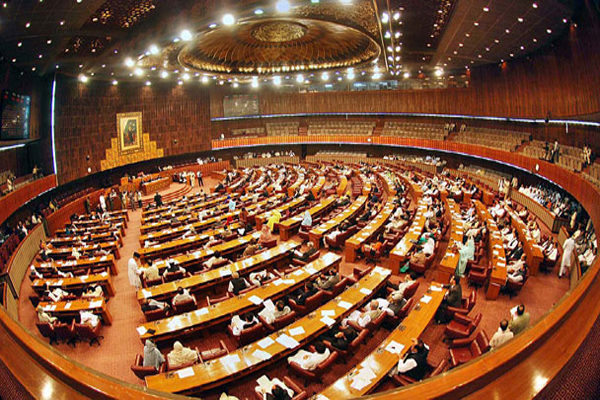ISLAMABAD: The National Assembly (NA) on Monday approved the charged expenditure of Rs27.9 trillion including servicing of domestic and foreign debt. The charged expenditure is included in demands for grants and appropriations for the financial year ending on June 30, 2023.
The charged expenditure includes Rs10 million for the Pakistan Post Office Department, Rs3.458 billion for superannuation allowances and pensions, and Rs22 billion for grants, subsidies and miscellaneous expenditures.
Rs510.971 billion have been earmarked for servicing of foreign debt, Rs3.792 trillion for foreign loans repayment, Rs142.771 billion for repayment of short term foreign credits, Rs6.095 billion for audit, Rs3.439 trillion for servicing of domestic debt, and Rs19.654 trillion for repayment of domestic debt.
Similarly, Rs296.876 billion shall be given for external development loans and advance by the federal government.
Furthermore, Rs50 million have been allocated for foreign missions, Rs310.2 million for the Law and Justice Division, Rs2.707 billion for the National Assembly, Rs2.348 billion for the Senate and Rs645 million has been allocated for staff, while personal household and allowances of the president, Rs3.091 billion for the Supreme Court, Rs1.12 billion for Islamabad High Court (IHC), Rs6.289 billion for the Election Commission of Pakistan (ECP), Rs100 million for the Federal Ombudsman Secretariat for Protection against Harassment of Women at the work place, Rs943 million for the Wafaqi Mohtasib and Rs 306 million for the Federal Tax Ombudsman.
Speaking on the occasion, Pakistan Tehreek-e-Insaf (PTI) MNAs stressed the need for reducing the country’s imports and increasing exports to strengthen the national economy while others called upon the government to adopt more austerity measures to reduce expenses.
Minister of State for Finance and Revenue Dr Ayesha Ghous Pasha said that around 98% of the charged expenses are related to debt and debt servicing, adding that the government was introducing structural reforms in the country’s finance and revenue system to reduce the budget deficit.
In this regard, she said that key structural reforms included measures to increase tax revenues, reduce current expenditures, compress imports, and boost exports of the country.
“Our focus and foremost priority are to control the budget deficit”, she said.




